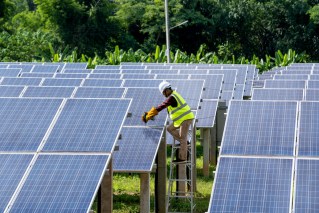These are the five industries set to soar over the next five years


IBISWorld says the future is bright for organic farming and ride-sharing services. Photo: TND
Organic farming and ride-sharing are set to become Australia’s fastest-growing industries over the next five years.
Growth in the two sectors is expected to outstrip the overall economy as increasingly health-conscious and tech-savvy consumers reshape the economic landscape.
Market research company IBISWorld forecasts both industries to grow at roughly 15 per cent per annum over the next five years, while newspapers, bookstores and free-to-air television continue suffering at the hands of online disruptors.
To put those figures into perspective, the Reserve Bank predicts the overall economy will grow 2.75 per cent this year and 3 per cent in 2021 – estimates that most economists consider optimistic.
IBISWorld’s forecasts are part of a broader report into the key industries set to boom and bust by 2030.
After organic farming and ride-sharing services, the report found online consumer electronics, mineral mining, and online groceries to have the brightest future this decade.
Meanwhile, menswear manufacturing and fibre optic installation are set for the largest contractions, with the latter expected to shrink 19.2 per cent per annum as the troubled NBN rollout nears completion.
IBISWorld senior industry analyst Tom Youl said the report’s findings reflected a shift towards online shopping and healthier lifestyles.
“That being said, I found the extent to which the organic farming industry is projected to grow quite interesting,” he told The New Daily, while noting the industry had previously grown in step with population.
“Organic produce is one of the most lucrative opportunities to come available to the agriculture sector in recent memory,” he said.
“This largely explains the forecast growth rate.”
Meanwhile, although the decline of traditional media has been well documented, Mr Youl said he was surprised to see the industry fall into IBISWorld’s bottom five.
“It just goes to show how successful streaming platforms have been in changing the expectations of media consumers,” he said.
The winners
- Organic farming is set to become a $3.7 billion industry by 2024-25, with rising health consciousness and growing environmental awareness turbocharging demand. IBISWorld notes that exports are also expected to grow significantly, at 14.6 per cent per annum over the next five years
- Ride-sharing services will continue to profit from growing demand for convenience. The industry is expected to grow 15 per cent per annum over the next five years, as worsening congestion sees car ownership fall out of favour
- A fat pipeline of innovative products means online consumer electronics will also enjoy double-digit growth (12.3 per cent) over the next five years. Mr Youl said the rollout of 5G would encourage consumers to upgrade and “use a greater number of devices”
- The rising popularity of electric vehicles could usher in another mining boom for Australia – only this time, in lithium and other minerals, not coal. A relatively weak Australian dollar will support the industry
- Demand for greater convenience will catapult online grocery sales into a $6.2 billion industry by 2024-25, with supply chain automation and in-depth customer data likely to fuel the next wave of growth.
The losers
- The expectation of the NBN rollout in 2020 will see fibre optic cable installation fall off a cliff in Australia. Only a government scheme to upgrade the network would safeguard the industry. But Mr Youl said “neither the government nor the opposition has signalled any intent on investing in a full upgrade in the near future”
- Fierce import competition is expected to slash the annual revenues of men’s and boy’s wear manufacturers by 8 per cent per annum over the next five years. “However, industry profit margins are anticipated to improve marginally … as the industry focuses more on producing premium quality goods not available online,” Mr Youl said
- Tough retail conditions and rising rents spell bad news for book stores. IBISWorld expects the industry to contract 2.8 per cent per annum
- Free-to-air television broadcasters won’t have much to cheer about, either. Shifting consumer behaviours and the rise of digital media platforms will knock off more than $500 million in industry revenue by 2024-2025. “[Subscription video on demand] providers offer a range of content at low prices, which will likely reduce advertising demand for free-to-air TV programs over the next five years as consumers move away from traditional TV broadcasts,” Mr Youl said
- Newspaper publishing will suffer a similar fate. Revenue is forecast to drop 2.1 per cent per annum over the next five years, thanks to a lower advertising spend. Mr Youl said this will encourage publishers to emphasise commentary and other emotive stories in an attempt to increase reader interaction.










